Joey Mataele, 54, is an activist from Tonga who’s faced abuse her entire life. As a ‘leiti’ – someone who is born a man but identifies as a woman – she’s campaigning for change, so she can finally be recognised for who she really is; a brilliant, brave woman.
“I was bullied by teachers and students. On my way home, people would walk past and slap me on the back of my head or call me a faggot. I would get into fights. I was always fighting,” remembers Joey Mataele, a prominent leiti activist from Tonga.
Joey grew up on the tropical Pacific Island of Tonga, known as the Friendly Islands because of the hospitable reception the inhabitants gave explorer Captain James Cook when he first landed there in 1773.
In her childhood, Joey could only dream of such a warm reception from Tongans. She didn’t feel welcome. In fact, she still has to fight for her place in her native Tongan community as members of her own family rejected her for who she is.
“My brothers and cousins would verbally abuse me, one of them put a rope around my neck, pulling it tight to make me sound like a man. On one occasion, he nearly choked me to death,” Joey recalls.
Besides such painful attacks and the clear message to stick to accepted gender norms, she didn’t give in. At the age of 14, she decided to openly live as a woman – a decision that put her at odds with family and school friends who saw her as a boy.
“I felt more as a woman than as a man,” says Joey.

In the past, this wouldn’t have been such a problem. Pre-colonial Tonga had a fluid notion of gender and was tolerant of same-sex relationships and transgender people, now called leitis. The leitis are a community of people that embrace diverse gender and sexual identities. They lived respected lives within society. But with the advent of colonialism and Christianity from the late 18th century, Tongan society became much more conservative and religious. As a result, attitudes towards leitis have now been tainted by prejudice and anti-LGBTI sentiments are rife.
Consensual sexual activity between men is illegal in Tonga under sections 136–142 of The Criminal Offences Act. It is punishable with imprisonment of up to ten years and whipping, but there is no record of the law being enforced. Same-sex relationships are not legally recognized, and it is illegal to change one’s gender. To stop this discrimination, Joey defends the rights of leitis as an LGBTI activist.
Joey remembers the first time she wore a dress in public: “The first place I wore it was to church. I walked in with my grandmother, she had a special seat, always sitting in the front… I had to take her to her seat… and well, that pleated blue dress was the highlight of the day.”
Expressing her gender identity has made Joey a target for abuse. When she was 14, she was raped by a man who worked for her father but couldn’t report it as male rape is illegal for both perpetrator and victim in Tonga.
“I was threatened by that guy not to talk about it, otherwise he’d do something to me. But when I realized I got a sexually transmitted disease from him, that’s when I had to tell my grandmother because I was suffering.”
Joey’s own father had no sympathy, he thought that her dressing as a woman was a sin and that she had provoked the rape. He had told her many times to “stop acting like a woman”.
This traumatic experience also marked a new beginning for Joey. “I decided to not tolerate any more of it,” she recalls. “I left school and started working. Throughout all of this, I had the support of my grandmother. She gave me her blessing.”

Joey does not see herself as a victim but as a strong woman who uses what she’s been through to support others and advocate for the rights of leitis rights in Tonga.
“I think my past experiences have motivated me to become an activist, it has strengthened me. It has empowered me to fight for the rights of our people. I don’t want the same problems that I went through during childhood to happen to the younger generation,” she says.
Together with other leitis, Joey founded Tonga Leitis Association in 1992 to campaign for the decriminalization of homosexuality and cross-dressing.
“One of the reasons why we established the association is to give a safe space for our people, our LGBTI community, to come and sit and talk about our issues, to be open-minded about what’s going on, to share what we’ve faced in life… At least we have a space where we can laugh, be ourselves and relax.”
Joey, the child who used to always end up in fist fights, has kept her fighting spirit but uses different methods now. “These days, I don’t do physical fighting. I do it properly. I sit down and talk to them. I am a humble fighter,” she says of her work educating people about leitis and LGBTI issues.
Joey and her fellow leitis also campaign for changes to the law which will allow them to change their gender identity so that they can be recognized for who they are. There are an estimated 400 leitis living in Tonga.
“I really do not want to say that I’m transgender, I would rather just say that I am a woman… once the government will allow me to change my identity, my ID card, my passport and all that.”
Ending legal discrimination of LGBTI individuals would finally make Tonga the Friendly Islands for all its people.


